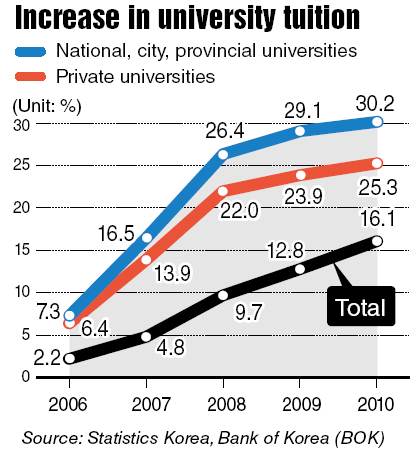Seoul considers paying interest on student loans for low-income families
The nation’s university fees saw a nearly 30 percent increase over the past five years, according to reports from central bank and the government Monday.
The figure came a day after the ruling Grand National Party resumed the discussion on a “half-tuition” policy.
According to the Bank of Korea and Statistics Korea on Monday, the nation’s expenditure on education increased 22.8 percent between 2005 and 2010.
In particular, the increase in college tuition fees was 30.2 percent in public schools and 25.3 in private ones, far above the average inflation rate of 16.1 percent during the same period.
If a new student paid 5 million won to enroll a university in 2005, now the payment has increased to 6.51 million won.

Early this year, the government adopted belatedly a new system that forces schools not to raise their tuition fees to more than 1.5 times the average inflation rate over the three previous years.
However, criticisms have been continued about its effectiveness in controlling the nation’s soaring college fees ― second-highest among OECD members after the U.S.
“A household with two college student children have to spend almost one-third of its annual income on tuition fees,” said an official at People’s Solidarity for Participatory Democracy, a major civic group.
“If they are son and daughter, the parents may solve the problem by having the son join the military duty. But there’s no way for those who have two daughters.”
Many civic groups have suggested putting a cap on the amount, not on the increase rate, saying tuition fees have nowhere to go up.
In a separate survey by the BOK last year, college tuition fee was one of the greatest financial burdens for Korean families along with food, private education, medical costs and loans.
Meanwhile, the Seoul Metropolitan Government also said Monday that it was considering paying the interest on student loans for students from low-income households.
If the pending discussion with the Seoul Educational Office reaches an agreement, some 12,000 college students studying in Seoul are expected to benefit from the second semester this year.
“Seoul has the largest number of college students coming from across the country. There may be a lot of applicants so it won’t be easy to fix the application conditions,” said a Seoul official.
“If the discussion goes smoothly, the support program is likely to start as early as this second semester.”
By Lee Ji-yoon (
jylee@heraldcorp.com)







![[Robert Fouser] Accepting migrants in South Korea](http://res.heraldm.com/phpwas/restmb_idxmake.php?idx=644&simg=/content/image/2024/10/31/20241031050896_0.jpg)
